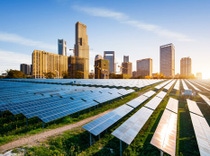Chemicals
Sustainability

Our Philosophy
We want to contribute to a world that provides a viable future with enhanced quality of life for everyone. We do so by creating chemistry for our customers and by making the best use of available resources. To optimize our contribution to a sustainable future, we measure the overall impact of economic, environmental and social aspects of our business activities with our value to society methodology.
Climate change is the biggest challenge of our time, we thus aim to achieve net zero CO2 emissions by 2050.
Our polyurethane and isocyanate products are part of the climate change solution, and we have created a suite of products to meet customers' carbon neutral goals.
We Source Responsibly
BASF assumes responsibility for environmental protection along the value chain.
We Produce Safely
We never compromise on safety. We respond to emergencies by being well prepared at all times and at all sites. Our operations are key to outperforming the competition sustainably, long-term. So, we’re connecting across BASF to operate in the most efficient way possible.
We Drive Sustainable Solutions
We have set voluntary long-term global goals in the areas of economy, environment, safety, employees and society. Through these goals, sustainable development at BASF is transparent and verifiable.
Our Sustainable Products
BASF’s certified 100% Biomass Balance (BMB) MDI & TDI products enable you to transition from fossil-based to renewable feedstock-based raw materials – reducing your CO2 emissions and fossil resource usage.
Our BMB MDI and TDI products are certified according to globally recognized ISCC PLUS and REDcert² standards and have the same properties as virgin products, so requalification and reformulations are not necessary.
Best of all, BASF’s BMB solutions are the most economical approach to transitioning to more sustainable products. There is no need for dedicated tanks, special equipment, or changes to your supply chain.
And with all our BMB certified MDI and TDI produced right here in the United States, BASF provides the confidence you need to scale up your sustainable production.

Lupranate M20 Isocyanate can be used for the production of rigid insulation foams by molding, spraying and frothing.
| BMB Isocyanate |
|---|
|
Lupranate M20 |
|
Certification: ISCC PLUS, REDcert² |
|
Environmental Impact: Low |
|
Applications: Rigid, Semi-Flexible skin Foams, Adhesives, Sealants & Elastomers |

Lupranate M70L is used for the production of various isocyanurate foams.
| BMB Isocyanate |
|---|
|
Lupranate M70L |
|
Certification: ISCC PLUS, REDcert² |
|
Environmental Impact: Low |
|
Applications: Isocyanate Foams |

Lupranate T80 is used in the preparation of polyurethane foams, prepolymers and elastomers.
| BMB Isocyanate |
|---|
|
Lupranate T80 TYPE 1 |
|
Certification: ISCC PLUS, REDcert² |
|
Environmental Impact: Low |
|
Applications: Polyurethane foams, prepolymers and elastomers |

Lupranate MM103 serves as the isocyanate component for the production of microcellular urethane elastomers.
| BMB Isocyanate |
|---|
|
Lupranate MM103 |
|
Certification: ISCC PLUS, REDcert² |
|
Environmental Impact: Low |
|
Applications: Coatings, adhesives, sealants, elastomers |

Lupranate M is used in the isocyanate component for the preparation of many CASE applications.
| BMB Isocyanate |
|---|
|
Lupranate M |
|
Certification: ISCC PLUS, REDcert² |
|
Environmental Impact: Low |
|
Applications: Coatings, adhesives, sealants, elastomers |

Lupranate MI isocyanate is used in the isocyanate component for the preparation of many CASE applications.
| BMB Isocyanate |
|---|
|
Lupranate MI |
|
Certification: ISCC PLUS, REDcert² |
|
Environmental Impact: Low |
|
Applications: Semi-flexible microcellular foams and coatings, adhesives, sealants, elastomers |

